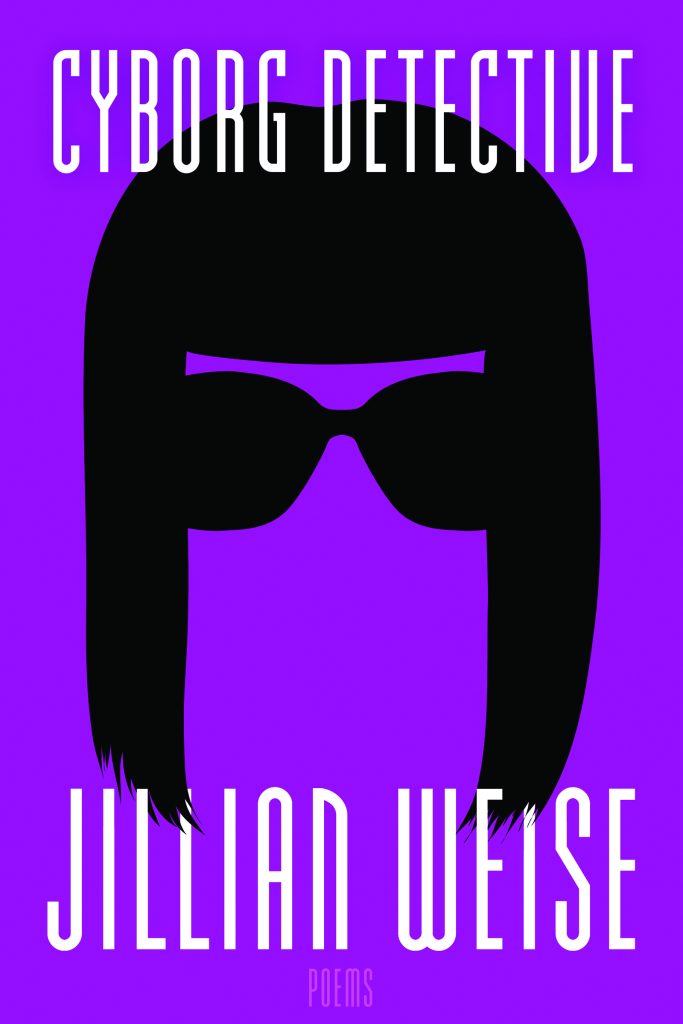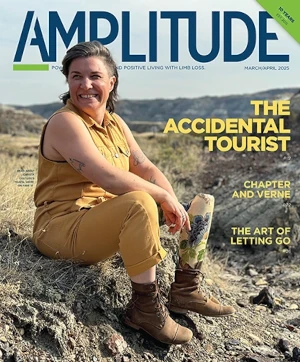Jillian Weise is an award-winning poet, author, and playwright, a creative writing professor at Clemson University, and a disability rights activist. She is also a cyborg.
She is used to this last descriptor raising eyebrows. Weise identifies as a cyborg because of her computerized prosthetic leg, a technological aid as essential to her personhood as any biological limb.
To those who argue “it’s not your leg,” she points out, “I always have to be wearing ‘not my leg,’” underscoring the irrelevance of the distinction. Weise refers to such naysayers as “tryborgs” because they are trying, but failing, to understand the cyborg (amputee) experience. Much of her work addresses the experiential gap between cyborg and tryborg.
In part, she thinks that some resist “cyborg” because it connotes something “hot, cool, and advanced in a way that upsets our notions about what an amputee woman is.”
Along these lines, Weise was inspired to write her first published poetry collection, The Amputee’s Guide to Sex (2007), because she was disappointed by the lack of literature in which people with disabilities explored their sexuality. Having encountered numerous texts in which the sexuality of a subject with disabilities is either erased or made pathetic—see Flannery O’Connor’s short story “Good Country People”—she wanted to bring visibility and agency to disabled sexuality.
Although Weise’s debut collection was widely celebrated, it also brought her unwanted attention from devotees—people who fetishize amputees. Only 25 years old when the book was published, she was approached by primarily white, cisgendered men in their 30s and 40s, usually married, who presumed she would be grateful for their sexual attention. They had interpreted her sexually themed book as an open invitation.
Even more disturbing, the devotees who became interested in Weise did not announce their intentions right away, instead presenting themselves as fans when they contacted her online or attended her readings. It would sometimes be months later when a devotee revealed his interest in a sexual relationship.
“I didn’t even know there was a subculture,” she says. “It was deeply alarming.”
Not only had these men made unwarranted assumptions about her sexual availability, they also made her question the motivation of anyone newly interested in her work. One man took his attention to terrifying extremes, stalking Weise for four years.
“It became apparent that I needed to go undercover online,” she says, a difficult step for a successful author accustomed to being part of literary communities and promoting her work on digital platforms. She stopped using her name and curated her online presence so that it included only pictures of her wearing wigs and other disguises.

With one online persona, Tipsy Tullivan, Weise becomes a well-intentioned but clueless tryborg with a long blonde wig and an exaggerated Southern drawl. In YouTube videos that are both playful and trenchant, Tipsy conducts painfully obtuse interviews with disabled artists and spouts uninformed advice on how to represent disability in writing.
In 2017, Weise published a 10th anniversary edition of The Amputee’s Guide to Sex that revealed a radical shift in her thinking about such representation. In a preface to the new edition, she acknowledges that her intended audience for the 2007 book was the nondisabled. “I will never do that again,” she says. “My audience is cyborgs, amputees, the disabled, for now.”
The last 13 years mark a period of tremendous evolution in both Weise’s career and worldview. She has published three other books—including the multiple-award-winning poetry collection The Book of Goodbyes—and collaborated with a vast network of disabled artists in various writing and performance art projects created specifically for disabled audiences.
One such project is A Kim Deal Party, a video play that inverts accessibility standards by, for example, positioning a sign language interpreter at the center of the screen rather than in the margins. Weise is careful to note that an audience of any size will include individuals with hidden disabilities due to our culture’s deeply ingrained ableism.
Also transformative for Weise was falling in love with a person with a disability. Having previously dated only nondisabled people, the experience transformed how she viewed herself. “Loving another disabled person was a recognition of my own self as an activist and radical thinker,” she says. “It was pretty giant as far as changing my ideology about audience and access.”
Next up from Weise is a book of essays discussing her cyborg identity and welcoming other amputees to claim it for themselves.
“You’re invited—it’s yours,” she says.
WEISE BOOKS

The Amputee’s Guide to Sex
A 2017 Los Angleles Review Best Book of the Year, the anniversary edition of Weise’s 2007 debut collection of poetry is a powerful lesson in desire, the body, pain, and possession. Weise wrote the book with the intention of changing the conversation around disability; essentially, she was tired of seeing “cripples” portrayed as asexual characters.

Cyborg Detective
In her third collection of poems, Weise delivers a reckoning to the ableism of the Western canon. The poems investigate and challenge the ways that nondisabled writers have appropriated disabled bodies. Cyborg Detective holds a magnifying glass to the marginalization and fetishization of disabled people while claiming space and pride for the people who already use technology and cybernetic implants every day. NPR named Cyborg Detective a Favorite Book of 2019.



